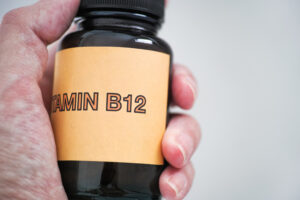Vitamin B12: Are You Getting Enough?
Written by Dr. Patrick Wen | March 10th 2025
Healthy eating is the habit we all promise ourselves but always have trouble sticking to. It is a habit that promises benefits ranging from increased energy to disease prevention. And while no, eating more broccoli is not the “one weird trick that doctors hate,” eating healthier and more importantly keeping track of your nutrition may be more important than we previously understood, thanks to new research on the role of Vitamin B12 and how its absorption changes as we age.
Now what is vitamin B12 and how does it help us?
Well, B12 serves many important roles in the body, and deficiencies in B12 can lead to issues like anemia and gastrointestinal discomfort. However, as a neurologist, I am, of course, principally concerned with the neurological symptoms of B12 deficiency, which include, but are not limited to:
- Cognitive slowing
- Forgetfulness
- Depression
- Weakness
- Numbness of the hands and feet
- Imbalance
Okay, so now that we have a better understanding of the role B12 plays in the body and the symptoms of B12 deficiency, let’s explore what lifestyle factors or other medical conditions may put us at risk for vitamin B12 deficiency. First of all, good news for any carnivores out there—eating meat and other animal-derived foods, such as yogurt, cheese, and eggs, should be supplying you with your daily B12 needs. For those who are vegan or vegetarian, there are some plant-based sources of B12, like seaweed, algae, and mushrooms, but a dedicated supplement is an easy way to cover your body’s daily B12 demand. Other risk factors for B12 deficiency include:
- Long term usage of anti-acids, PPIs, and H2 blockers
- History of gastric or bariatric surgery
- Chronic alcohol use
- Metformin use
- And lastly, somewhat of a new phenomenon, but the use of nitrous oxide or whippets as a recreational drug is exposing a mostly younger audience to the wonders of vitamin B12 deficiency.
Now, if you’re a younger individual reading this (and in the medical field, when I say young, I mean under the age of 65), you can skip to the next paragraph, as the following likely does not apply to you.
 New research is showing that what we once considered “normal” levels of B12 in the human body may actually be insufficient as we grow older. Researchers in California studied a group of 231 individuals with an average age of 71 and found a correlation between lower B12 levels and cognitive slowing. While these findings certainly do not demonstrate causation, as we will see, given the low risks of B12 supplementation, it is something I would encourage those concerned with declining cognitive performance to try.
New research is showing that what we once considered “normal” levels of B12 in the human body may actually be insufficient as we grow older. Researchers in California studied a group of 231 individuals with an average age of 71 and found a correlation between lower B12 levels and cognitive slowing. While these findings certainly do not demonstrate causation, as we will see, given the low risks of B12 supplementation, it is something I would encourage those concerned with declining cognitive performance to try.
So you have some of the symptoms and risk factors that I mentioned above, what can we do about it?
Well, thankfully, diagnosing a B12 deficiency is a relatively straightforward process, involving a small blood sample and a day or two to process the lab work. Treatment is also straightforward in most cases, with a daily supplement of 1000mcg of B12 taken once a day. Vitamin B12 is readily available over the counter and relatively inexpensive, costing around $10.00. I would also recommend avoiding any flashy branding and sticking with a more affordable supplement from a reputable brand. If you have a history of stomach or small intestinal issues, an intramuscular injection may be necessary to bypass any absorption issues in the gut.

As a “water-soluble” vitamin (i.e., it dissolves in water), any excess vitamin B12 you take in is generally easily excreted in the urine, and there are no known complications from excessive vitamin B12 intake. However, this is not a boundary I encourage anyone to test at home.
And finally, if you have any other questions about B12 deficiency, I always recommend speaking with your doctor regarding any questions or concerns.
